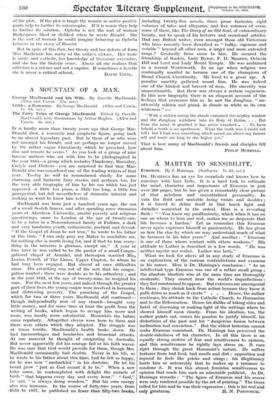A MARTYR TO SENSIBILITY.
Erasmus. By J. Huizinga. (Scribners. 7s. ad. net.)
DR. HUIZINGA has an eye for essentials and knows how to convince with bare facts. It is a hard task to estimate the mind, character and importance of Erasmus in just over 200 pages, but he has given a remarkably clear picture of that nebulous and =centralized personality. In vain the fluid and unstable being twists and doubles ; it is forced to define itself in that harsh light and dwindles somewhat in the ordeal. Here is a revealing flash : " ' You know my pusillanimity, which when it has no one on whom to lean and rest, makes me so desperate that life becomes a burden.' Let us remember this Erasmus never again expresses himself so passionately. He has given us here the clue by which we may understand much of what he becomes in his later years." And another : "Erasmus is one of those whom contact with others weakens." His attitude to Luther is described in a few words. "lie was neither mystic nor realist. Luther was both."
What we look for above all in any study of Erasmus is an explanation of the curious contradictions and evasions in his career. Here is Dr. Huizinga's conclusion : "As an intellectual type Erasmus was one of a rather small group ; the absolute idealists who at the same time are thoroughly moderate. They cannot hear the world's imperfections : they feel constrained to oppose. But extremes are uncongenial to them ; they shrink back from action because they know it pulls down as much as it erects" . . . Hence, the author continues, his attitude to the Catholic Church, to Humanism and to the Reformation. Hence his dislike of taking sides and habit of disowning or making light of the writings where he showed himself most clearly. From his idealism, too, the author points out, comes his passion to justify himself, his distortions of the past and his "dangerous fusion between inclination and conviction." But the ablest historian cannot make Erasmus consistent. Dr. Huizinga has perceived the double-sidedness of his character. In all this there is an equally strong motive of fear and sensitiveness to opinion, and this sensitiveness he rightly lays stress on. It runs right through the great Humanist's nature. He suffers tortures from bad food, bad smells and dirt ; opposition and reproof he feels like pricks and stings ; his illegitimacy hurts him so unbearably that he makes up a romance to condone it. It was this almost feminine sensitiveness to opinion that made him such an admirable publicist. As Dr. Huizinga remarks : "The figure of Erasmus and his oeuvre were only rendered possible by the art of printing:" The times called for him and he was their expression ; this is his real and


























































 Previous page
Previous page